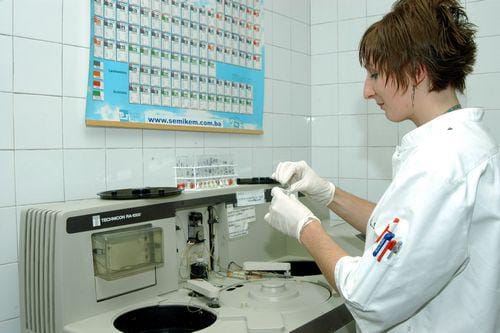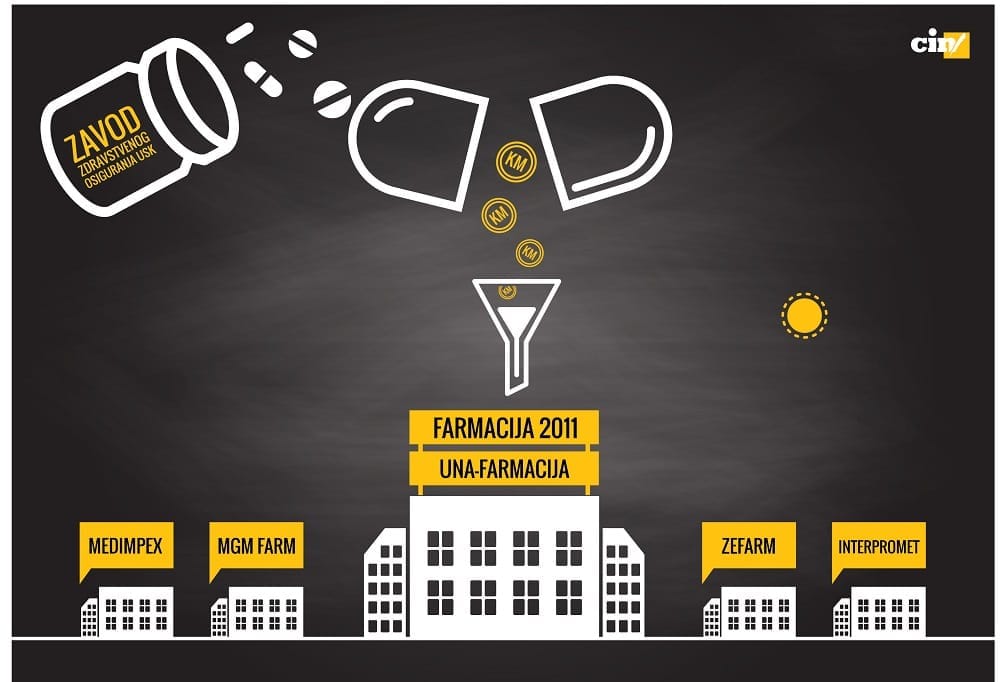While the patients of BiH’s bankrupt health care system quietly queue in the narrow dilapidated corridors of the country’s health centers, one of them, BiH Academy of Arts and Sciences member Dr. Grujica Žarković has raised his voice.
Žarković is an expert on health care in BiH for at least two reasons. He is the president of the committee for health care of the Academy’s Medical Section. He is also 90 years old, and illness has recently kept him in the hospital several times.
Before the illness he tried to get someone to listen to the committee’s proposal on how to fix the system. Žarković sent a letter to 46 of the highest authorities in the entity governments and the BiH state, begging them to take some advice.
In the letter, Žarković said that BiH has a ‘paralysis of health policy’ which has resulted in the ‘unnecessary torture of patients’ who simply want basic health care. But this is a minimal request that a bureaucratically bloated system, which spent nearly 1 billion KM last year, has no way of meeting.
‘Even though there are enough resources in BiH to offer quality health care to the citizens – enough health care professionals, enough health care institutions and equipment, and even enough money’ Žarković’s letter said, ‘your health ministries apparently don’t know how to successfully use those resources, nor are they willing to listen to the advice of people who do know.’
Žarković’s indictment is shared by auditors and medical workers within the system, who spoke with a team of nine reporters from the Center for Investigative Reporting in Sarajevo (CIN). The team spent the last month talking with patients and experts, like Žarković, inside and outside of the system. In a series of 10 stories, the center lays out the case against the system and tries to find out who is responsible for the health disaster, and who is going to fix it.
The labyrinth of 13 health insurance funds, 13 health ministries and 264 health institutions that employ 36,500 medical and non-medical employees in Bosnia-Herzegovina have wasted millions, according to health officials and experts.
Auditors’ reports state that much of the money is not adequately accounted for, and in some cases misdirected to other uses. Even worse, auditors say the multiple insurance funds are owed millions in employee payments from private and public companies, and therefore leave clinics and hospitals without enough funding.
Seriously ill patients speak of nightmare rides to distant hospitals because one entity’s insurance will not pay for care at a nearby facility in another entity. Institution directors admit that they are providing services that are duplicated a few kilometers away, but they resist giving up their kingdoms, even for the sake of efficiency.
Almost a year ago, Žarković sent the letter urging the academy committee’s suggestions to solve these problems. It was the third time since 2003 that the academy’s committee of experts had tried to contact members of the government and the health care system to, in Žarković’s words, ‘wake them up from their winter lethargy.’
In a weak voice because of his failing health, Žarković said this week that to date no one had woken up long enough to respond to any of his letters.
Perhaps it is because no one knew where to send the committee’s ideas. When it comes to responsibility for the system’s problems there are few people to pick up the phone, according to health officials.
‘The system of responsibility is so inefficient that it is almost impossible to point at someone and say: You are responsible for this’ said BiH Minister of Civil Affairs Safet Halilović.
It may be difficult to assess responsibility, but probably not impossible for the experts who say that reform is more a matter of will than of ideas.
The committee’s aggressive 16-point plan includes a total organizational and financial restructuring of the system.
The plan includes recommendations to change to a competitive system where doctors would not be employees. Doctors would have contracts and be paid according to their success with patients. Hospitals would still be public institutions but they would be economically independent. A clinic or hospital’s success would depend on if the doctors they hired could attract and keep patients with good service.
All of these changes would be based on a single medical care system that would replace the multitude of entity funds and ministries with a single state-level ministry of health, according to Dr. Zijad Bešlagić, the vice-president of the BiH Academy’s committee for health care.
Medical professionals inside the current system agree that the decentralized system is wasting millions.
Experts, among those Dr. Bakir Nakaš, director of the State Hospital in Sarajevo, believe that the 1 billion KM spent last year is sufficient for the improvement of the health system. The major issue is the distribution of financial means.
‘Take that amount, link it to a map and graph it by how much money is spent on health care per capita’ Nakaš said, ‘and you will be able to see how colorful the differences among cantons in the Federation and between entities are.’
One of those differences is that out of the 1 billion KM used for health care, only 20 percent goes to the Repulika Srpska (RS).
For comparison, the total RS Health Insurance Office’s budget for the whole entity is only slightly higher than that of the Sarajevo Canton Health Insurance Office’s budget.
The director of the Clinical Center in Sarajevo, Dr. Faris Gavrankapetanović, said that a single state-level system would be able to more efficiently use a 1 billion-KM budget.
But Gavrankapetanović agrees with a point also raised by the BiH Academy’s medical committee. It will be difficult to get politically appointed health care administrators to agree to state-level reform.
‘Only the huge over-expensive administration fears the changes. They are scared of losing their jobs with the creation of a single health insurance office’ Gavrankapetanović said. ‘It would certainly represent an improvement for both doctors and patients.’
It is easy to see what is at stake, said BiH Civil Affairs Minister Halilović, who offers the examples of drug sales and the foreign treatment of BiH patients.
‘We are talking about big money’ Halilović said. ‘Specifically, in the purchasing of medicines, but as well in medical treatment of patients abroad. No one is willing to give up power and money, and all that costs taxpayers a lot.’
Health care services in neighboring Serbia-Montenegro are three times more expensive than in both the RS and the Federation of BiH, according to Luka Kosanović, director of the Trebinje branch office of the RS Health Insurance Fund. The costs are high enough that the RS fund owes 42 million KM to the Health Insurance Office of Serbia-Montenegro. The FBiH cantons, particularly those with a Croat majority, together owe 60 million KM to Croatia, according to Jasenka Pap, deputy director of the Croatian Health Fund.
BiH patients can get the same health care services, for which they go to neighboring countries, and keep the money in the country at the same time, medical officials agreed.
‘If that amount of money…100 million marks, used for treatments abroad, remained in BiH, it would be an improvement for all of us’ said minister Halilović.
For the patients who are treated in BiH, their treatment can depend on where they go. Some institutions have needed medical equipment and others do not.
Part of the reason is that some clinics and hospitals seem to be able to fund themselves while others are waiting for insurance funding that never seems to arrive.
The hospital in Sanski Most is only one of many examples of lack of medical equipment in health institutions in BiH. This hospital has no equipment for kidney dialysis and 10 patients from this town travel three times a week to Bihać, 130 km away from Sanski Most.
The health center in Odžak also has difficulties. This health center, according to manager Ante Majić, needs an EKG instrument, an aspirator and ultrasound equipment; the emergency vehicle is poorly equipped and has no resuscitation device.
Marin Kvaternik, the RS minister of health, justifies the lack of medical equipment in hospitals in the RS by stating that up-to-date medical care is very expensive.
‘The issue with the lack of medical equipment arose when donors’ assistance stopped’ Kvaternik said. ‘Hospitals were not ready to face the fact that they have to fund the purchase of equipment themselves. Hence some hospitals cannot cover basic needs of their patients.’
Kvaternik believes the issue of equipment will be solved when public purchases are put out for bid, which will make it possible to obtain better equipment for less money.
FBiH Health Minister Tomoslav Lučić said that currently hospital management had the last word when equipment was purchased. But that responsibility should probably be moved to the FBiH ministry, Lučić said.
Meanwhile, some institutions are not waiting for government to act.
Gavrankapetanović, the Sarajevo Clinical Center director, said that the 60 million KM that the center receives from the cantonal fund are used to pay salaries for the 3,500 employees.
When it comes to medical equipment, the center is already following private market instincts to raise the funds, similar to the suggestion in the Academy’s 16-point plan. The center purchases 90 percent of their medical equipment from the income they make providing medical assistance to other cantons, Gavrankapetanović said.
Whether health care reform can ever rise above the individual efforts of medical workers to the system changes suggested by the Academy’s medical committee are doubtful, according to most observers.
‘Almost every issue in the health system comes from the constitution’ said a gloomy Minister Halilović. ‘Whenever there is an attempt to change something, nationalistic interests are at stake, even when we talk about health.’
Žarković, the 90-year-old Academy member, found a similar but equally dark reason for the situation of BiH health care.
‘In BiH neither of the entities is leading the health policy (debate) because the ministries of health can do their job easier if nothing is changed, and everything goes on just the same as it did 50 years ago in the time of (communism)’ he said in his unanswered letter to 46 government officials.










